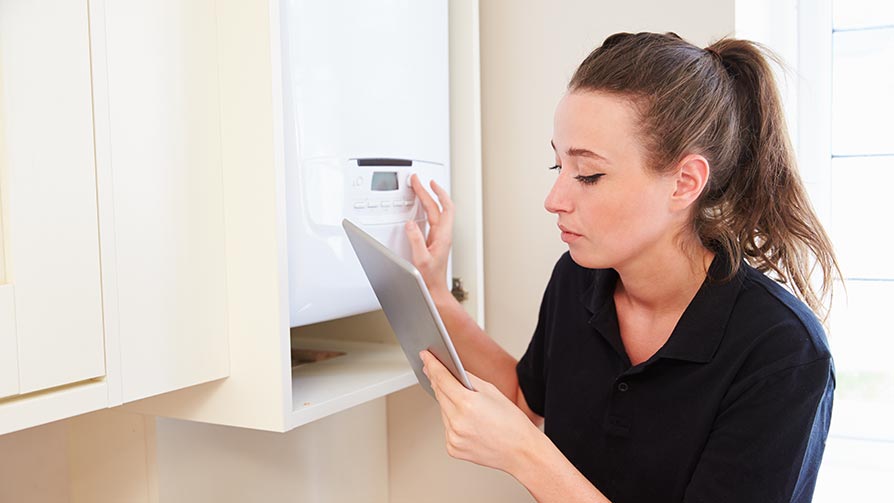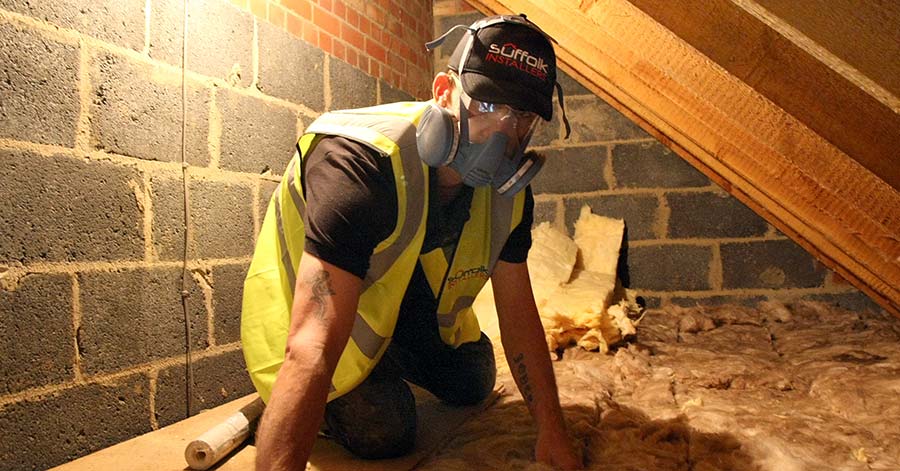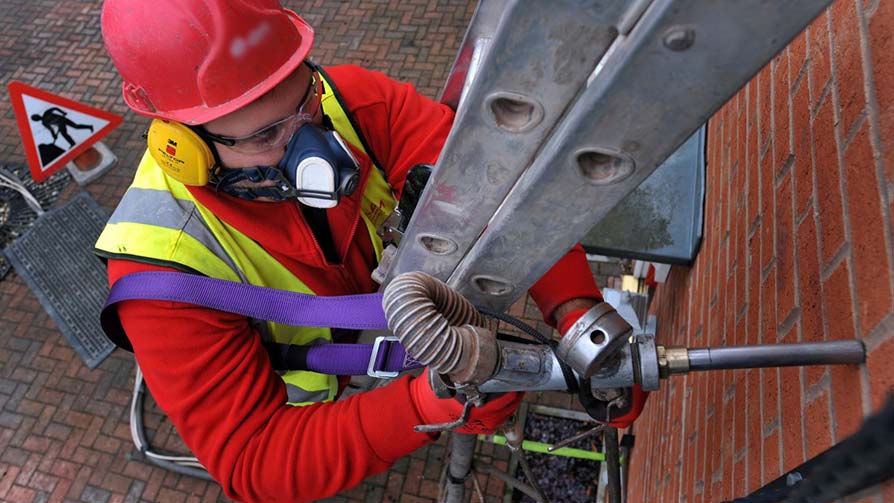How can I make my home energy efficient?
Making your home more energy efficient will cut costs in the long run and make it a warmer, more comfortable place to live in the cold winter months and cooler on hot summer days. By reducing your energy usage, you'll cut your carbon emissions and do your bit for the environment too.
Ways to improve your home to make it energy efficient
Here's a list of different ways you can change your property to make it a more energy efficient home and we've included some little tips and tricks that will help reduce your annual bills, save money and live greener.
- Reduce your heating or use a secondary heating source
- Use a new, energy efficient boiler
- Fit insulation
- Double or triple glazing
- Draught proofing
- Generate your own energy from renewable sources
- Energy efficient fittings
You can click the links to skip to a section.
We've also stated if building regulations (or 'regs') approval is required for the home improvements. You'll need to go through this process to ensure any work follows the codes of practice and complies with the Building Regulations (2010) – Government rules for building work in new and altered buildings to make them safe and accessible and limit waste and environmental damage.
Use your heating less
Here are some cheap and simple ways to keep your house warmer and reduce how much you use your heating.
- Reduce the temperature of your heating while you're away from home.
- Use door insulation strips to seal gaps around drafty doors. See the draught proofing section for more on this.
- Invest in thick curtains and shut them to prevent heat escaping through the windows.
- Rugs and carpets on the floor will help your feet feel warmer. Hot water bottles are useful too.
- Tired of your room layout and fancy a change? Re-arrange some things and while you're at it, move your furniture away from the radiators to allow the heat to disperse into the room.
Building regs approval required? NO
Upgrade your boiler
Old boilers tend to lose a lot of heat and are less-efficient. Upgrading to a newer model means that it will be cheaper to run and you'll be kind to the environment by reducing your home's carbon dioxide emissions. Boiler efficiency is rated using letters A-G; a modern condensing boiler is the most efficient on the market and nearly all of them in the UK get an A energy rating. The Energy Saving Trust, an organisation devoted to promoting energy efficiency and conservation, estimates that replacing an old G-rated boiler with a modern A-rated boiler with a full set of heating controls will save you around £340 a year on your gas bill (not including installation).
Building regs approval required? YES
You can get building regs approval by employing a boiler installer who is a member of a Competent Person Scheme. They can self-certify that their work is compliant with the building regulations.
Insulation
Insulation can bring the biggest benefits in terms of retaining heat in your home, reducing the need for heating. A warmer, fitted-out home can reduce the possibility of damp later on and can raise the property's value. Insulation will also make it easier to keep your home cool in the summer months. Below are the main insulation options.
Loft insulation
It's believed that one quarter of heat is lost through the roof of a house which isn't insulated. Installing insulation in your loft, attic or flat roof will reduce heat loss and heating bills significantly. Using rolls of mineral wool insulation between the joists is the usual method and treated cellulose or polyurethane foam is often used for areas that are hard to reach.
Building regs approval required? NO
Solid wall insulation
Heat loss and heating inefficiencies are a common problem for older homes and Victorian buildings. These properties usually have solid masonry walls and you can insulate these by fixing insulation boards to the internal walls, or by fixing insulating material to external walls and then finishing the insulation with render or cladding. Adding insulation to solid walls either internally or externally requires some care. For more information, see Historic England's useful guide on Energy Efficiency and Historic Buildings – Insulating Solid Walls. Your local building control team will also be able to offer guidance.
Building regs approval required? YES
Building regs would apply if you're doing renovation work on 25% or more of an external wall, that is adding a new layer or replacing an existing layer. Internally, there are quite a few things to consider so refer to our article about wall repair and insulation basics for more information and your local council building control department will be happy to offer guidance on your home improvement project.
Cavity wall insulation
Some houses have inner and outer walls with hollow spaces in-between them. Installing insulation in these spaces can be done in a few hours and isn't too expensive compared to insulating solid walls. It can also be done from outside your home, leaving no mess inside. How is this done? Small holes are drilled in the external wall and then insulation is blown or injected into the cavity. Then holes are then filled to match the existing finish.
Building regs approval required? YES
Contractors carrying out cavity insulation work will most likely be registered with the Cavity Wall Insulation Self Certification Scheme (CWISC) and notification of the installation will be sent to the local building control team.
Floor insulation
Savings in relation to floor insulation are small in comparison to wall or roof insulation but the methods tend to be simpler and less expensive. Keep your house warm by insulating the ground floor; you don't usually have to insulate floor space on upper floors unless they're above unheated spaces like a garage.
If you're living in an older house it's likely that you have suspended timber floors – you can check by lifting up the carpet to see. Insulate the floor by lifting the floorboards and laying mineral wool insulation above a layer of netting between the joists. If you have gaps in the floorboards you should seal them – read more about this in the draught proofing section.
Newer homes are likely to have a concrete ground floor and may already be insulated.
Building regs approval required? YES
Have a smart meter installed
Smart meters and In Home Displays (IHD) help you keep track of the energy you've used, when it was used and how much it will cost. By seeing accurate, real-time information you'll be better at managing your energy usage, cutting down on waste and saving money in the long-term. Some smart controls allow you to have finer control over your heating, such as targeting different areas of your house or adjusting timings and settings (via a mobile app) when you're away.
The installation of smart meters in homes and businesses has already begun; you may have even already been contacted. Installations are carried out by trained staff from your energy company who will provide the smart meters and IHD units with no up-front or one-off charge. You basically pay for the cost of the smart meter through your energy bills.
The government aims to roll out smart meters as standard across the UK by 2024 although there's no legal obligation on you to have one.
Building regs approval required? NO
Fit double (or triple) glazing
As shown in the thermal images in this article, a lot of heat in a building can leak through the windows. Installing double or triple glazing might cost you more initially but energy efficient windows will save you money in the long term, plus you'll get other benefits such as reduced external noise and better protection from the outside elements.
Building regs approval required? YES
External windows are classed as 'controlled fittings' in the Building Regulations and need to meet certain standards when being installed or replaced. Such standards include the level of heat which can pass through the glass (measured in u-values).
You won't need to apply for building control approval if your windows are fitted by an installer registered with a Competent Person Scheme. Once the job is done they can issue you a certificate of compliance with the building regs.
Draught proofing
This involves simply filling in the gaps where cold air can enter your home – think: gaps around doors, windows, loft hatches, floor boards, fittings, cracks in walls and exposed pipework. There are all kinds of materials you can use to fill in the gaps, for example:
- self-adhesive foam strips
- metal or plastic strips with brushes or wipers
- shaped rubber or plastic
- flexible fillers
- silicone sealant (also known as decorator's caulk)
- expanding polyurethane foam for larger gaps (this expands as it dries and sets hard).
Building regs approval required? NO
Generate your own energy from renewable sources
Make the most of naturally occurring energy and generate your own heat or power for your home. Here are some ways you can do this.
Solar panels
Install these and you'll get free energy from the sun – they even work when it's cloudy so the UK weather is not a problem! Solar panel electricity systems, known as photovoltaics (PV), convert sunlight into electricity which is used to power household appliances and lighting. The initial cost and installation may be high but in the long run you'll cut your electricity bills and carbon footprint since it's a clean, green renewable energy source. It's possible to install energy feedback displays which enables occupants to optimise use of renewable energy. You can even sell any surplus energy back to your electricity supplier.
Building regs approval required? YES
Ground source heat pumps (GSHPs)
A ground source heat pump circulates a mixture of water and antifreeze around a loop of pipe buried in your garden. The pipe extracts heat from the ground which is then used to heat your water as well as your home. Ground source heat pumps are low maintenance and you can use them all year round because the ground surrounding the pipes stays at a fairly constant temperature.
Building regs approval required? YES
Air source heat pumps (ASHPs)
These pumps contain a fluid which absorbs heat from the outside air which is then transferred to the heating and hot water circuits in your home. They're are usually easier to install than ground source heat pumps because they don't need any trenches or drilling, but they can be less efficient. You'll need to install the pump unit outside, fit it to a wall or to the ground with sufficient space around it to ensure good air intake.
Building regs approval required? YES
Note: Check that the installation of solar panels or heat pumps is done by a contractor registered with a Competent Person Scheme. They will ensure that your local building control team is notified about the installation work.
Switch to energy efficient fittings
A few more ideas to help you reduce your energy use and bills:
- Use LED light bulbs and downlights – the most efficient type available and they last up to 10 times longer than normal bulbs.
- Consider smart controls such as PIR (passive infrared sensors) that detect motion or daylight sensors. Lighting can be switched off automatically when there's no activity in the room.
- Water-saving shower heads – these restrict the volume of water that flows through them whilst retaining the sensation of pressure that a normal shower has. Suitable for use if your shower takes water straight from the boiler or hot water tank.
- Reduced-capacity baths – but remember that a quick shower is always more water-efficient.
- Low flow taps – can be fitted to bathroom and kitchen sinks.
- Low flush toilets.
- Consider investing in energy efficient appliances, for example: washing machines, freezers, secondary heating, kettles.
Building regs approval required? NO
Sensible energy use
The UK has committed to an 80% reduction in greenhouse gas emissions by 2050. Taking more energy efficient measures in your home will save energy and reduce your annual bills. If we all chip in, the population will be less reliant on non-renewable resources (such as coal, petroleum, natural gas) which are likely to cost even more in the future. There are some energy efficient home improvements that you can easily do yourself and won't have to pay over the odds. Other improvements may cost more but they'll bring greater benefits.
If you're planning major works be sure to contact your local building control team who'll be happy to advise you on all the modern energy saving innovations we've mentioned. They'll provide guidance along the way and check that all major home improvement work is in accordance with the building regs.
Last updated: 26 October 2020.
Visit the Simple Energy Advice website for ideas and estimated costs
Keep learning
- Recycled insulation products to help save the planet
- Clean Growth Strategy: Aiming for a low carbon future
- Tackling insulation challenges
- How to get it right: Roof insulation
- Insulated roof panel installation for energy efficient buildings
- Why is building control important?







